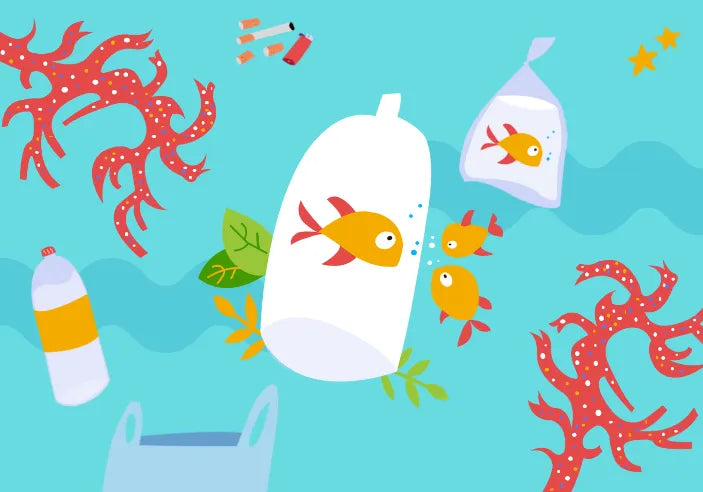The world has produced more than 9,500,000,000 tonnes of plastic, that’s more than a tonne for every one alive. This staggering volume of plastic waste poses significant environmental challenges. There are three main reasons why plastic is causing harm to our planet:
- The production of plastic is heavily reliant on fossil fuels
- It never decomposes, it simply breaks into tinier and tinier pieces, known as microplastics
- Plastic pollution poses a severe threat to nature, especially in our waterways
The good news is there are many ways to reduce plastic usage, so why not start your Plastic Detox today?
Here we will share some easy ways for you to act on plastic and share some ideas on how we can help reduce its immediate effects on nature.
How To Reduce Our Use Of Plastic
We’ve all heard the phrase ‘reduce, re-use, recycle’, but these are not all of equal importance. The most important thing we can do is reduce the amount of plastic we use. This could be not using single-use water bottles, choosing food items with less packaging when we shop, or buying plastic alternatives such as plastic-free bathroom products. If we reduce what we use, we reduce the demand for products containing plastics.
The second-best thing we can do is to reuse the plastic we do have. Whether this is carrier bags, bottles or plastic containers. It could also be wearing our clothes for longer. Synthetic fibres in clothing account for 10% of all plastic usage.
Finally, when we must buy or use plastic, we should recycle it. The reason this comes third is because, whilst recycling is preferable to incineration or landfill, plastic cannot be recycled forever (unlike metal). So, recycling delays, rather than avoids, landfill.
Here are three things to have in mind when trying to reduce your plastic use:
- Cut: reduce the single-use plastic you buy
- Swap: change a product or shop for lower packaging options. Think soap bars rather than shower gel in plastic.
- Sometimes stop: Try to stop using single-use cutlery or plastic bags (these tips can be help you save money too).
Plastic In Food Packaging
Do we need cucumbers or bananas wrapped in plastic? This is an excellent area to focus on cutting and swapping. Try to choose shops and products where packaging is a minimum. Zero-waste shops are often the best option, but if you don’t have one, try to find local shops which use minimal packaging or paper bags.
You can also choose products that have minimal packaging. At one extreme, take-away meals are often packaging heavy, whereas buying frozen meals packed in cardboard can be a much lower packaging option. Similarly, fresh food sold in supermarkets often uses plastic packaging, whereas you might swap to a smaller, local store that uses less or different packaging.
Bathrooms And Cleaning
How many plastic cleaning product bottles do you have in your home? And how many bottles of gels, shampoos, and nice-smelling potions can you find in your bathroom? Using up all your half-used bottles and then check whether you need to replace them is a great way to reduce plastic use and costs. For example, a single shampoo and soap bar can minimise plastic, cost, and clutter.
Likewise, although supermarket aisles stock hundreds of different cleaning products, it’s worth going for simpler cleaning and using refills.
Plastics Out And About
When we are away from home, it is often harder to avoid single-use plastic. Everything from coffee cups to plastic water bottles and sandwich packs is typically single-use plastics. Here is a checklist to help you have a sustainable day out, and coffee cups and water bottles can be costly and give you what feels like a mountain of single-use plastic to get rid of at the end of each day.
We buy enough plastic bottles globally to lay them around our planet 8x every day. What’s more, most plastics ever created are still in existence today.
Look Out For That Hidden Plastic
Another way to reduce your use of plastic is to develop an eagle eye for unlikely use cases. Because it is so versatile, it is used widely in products, including crisp packs, cigarette filters, fleece, and wet wipes.
Increasingly there are alternative, plastic-free items available, so, if possible, you can go for the swap option here. Or, if not, are you up for the ‘sometimes stop’ approach?
Reducing Plastic In The Environment
One of the most pressing problems with plastic is that a lot of it ends up as litter and as a result a threat to wildlife. Wild animals can become entangled in it, or eat it, both of which can be fatal.
Beach cleans and litter picks are a great way to help remove plastic and rubbish that is a threat in your local area.

